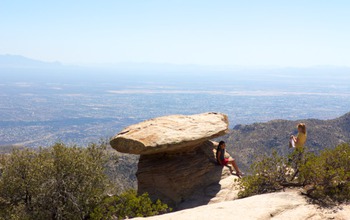![]()
Press Release 14-043
Environmental stewardship motivates latest White House Champions of Change![]()
NSF-funded scientists are recognized in White House event
|
Arizona middle school students study the geology of the Tucson basin from the Santa Catalina Mts. |
March 25, 2014
Benjamin Blonder and Billy Spitzer are among 14 environmental and conservation leaders honored by the White House as Champions of Change at a ceremony in Washington, D.C., last week for their work on environmental stewardship and community involvement.
Benjamin Blonder is an NSF Graduate Research Fellow who recently completed his Ph.D. in the Department of Ecology and Evolutionary Biology at the University of Arizona. He co-founded the University of Arizona’s Sky School, a residential science school that provides inquiry-based environmental education on a campus located in the heart of the Coronado National Forest. Because of his efforts, each year hundreds of K-12 students, primarily from Title I schools, are now able to conduct independent research while exploring the unique ecology, geology, and astronomy resources of the region.
“My science outreach has been possible with the financial support of my Graduate Research Fellowship,” says Blonder. Among his outreach prior activities was a GK-12 (NSF Graduate STEM Fellows in K-12 Education) collaboration between the University of Arizona and Miles Exploratory Learning Center in Tucson to bring science resources to teachers and classrooms.
Billy Spitzer is vice president for programs, exhibits, and planning at the New England Aquarium. He is responsible for oversight of exhibit design, visitor experience, volunteer, and education programs, as well as institutional strategic planning. He is supported by NSF through the Division of Research on Learning to strengthen the capacity of informal science education institutions to increase public understanding of climate change and its impacts on coastal zones and marine life. In addition, he is funded by the Division of Ocean Science to take a leadership role with the Centers for Ocean Sciences Education Excellence.
“NSF support has enabled us to develop, test, and refine our climate change training program, and now is enabling us to scale it up to reach more than 150 aquariums, zoos, and science/nature centers across the country,” says Spitzer.
The Champions of Change program began in 2011 when President Barack Obama called for recognition of citizens doing extraordinary things at a local level. Champion of Change honorees are chosen through a rigorous nomination and selection process. Two NSF-funded educators were honored earlier this year, and four NSF-funded scientists were among the Champions of Change honored in 2013. Previous NSF-supported honorees include Liesl Chatman, Elisabeth Hayes, Bobby Schnabel, Virginia Stern , David Rose, Christine Reich, George Kerscher, and Henry Wedler.
To learn more about the White House Champions of Change program or to nominate a champion, visit the Champions of Change website.
-NSF-
![]()
Media Contacts
Maria C. Zacharias, NSF, (703) 292-8454, mzachari@nsf.gov
![]()
The National Science Foundation (NSF) is an independent federal agency that supports fundamental research and education across all fields of science and engineering. In fiscal year (FY) 2014, its budget is $7.2 billion. NSF funds reach all 50 states through grants to nearly 2,000 colleges, universities and other institutions. Each year, NSF receives about 50,000 competitive requests for funding, and makes about 11,500 new funding awards. NSF also awards about $593 million in professional and service contracts yearly.
Useful NSF Web Sites:
NSF Home Page: http://www.nsf.gov
NSF News: http://www.nsf.gov/news/
For the News Media: http://www.nsf.gov/news/newsroom.jsp
Science and Engineering Statistics: http://www.nsf.gov/statistics/
Awards Searches: http://www.nsf.gov/awardsearch/
![]()
